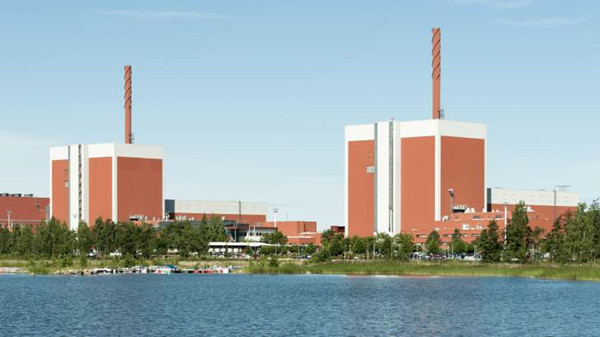Nuclear power plant operators are carrying out remote quality and safety related assessments of systems, structures and components (SSCs) to overcome physical distancing and mobility restrictions during the global COVID-19 pandemic, participants in a recent International Atomic Energy Agency (IAEA) webinar said. SSCs must be regularly monitored, replaced and have their quality verified.

Units 1 and 2 of the Olkiluoto plant in Finland, where TVO successfully carried out the annual refuelling outages despite the travel restrictions on the workforce, and the need to postpone some refurbishment projects and adjust the outage schedules (Image: TVO)
"The pandemic has tested the resilience of the nuclear power industry and sparked the development of innovative solutions to a range of challenges, including to the supply chain of goods and services such as assessments of SSC and suppliers," the IAEA said. However, limitations such as reduced on-site staffing and travel restrictions have forced both operators and suppliers to rethink their practices.
Panelists in the 9 July Webinar on COVID-19 and Its Impact on the Nuclear Power Supply Chain discussed how their organisations had been meeting these challenges, including by carrying out remote assessments.
Marc Tannenbaum, a senior technical executive at the Electric Power Research Institute (EPRI) in the USA, talked about issues experienced by US nuclear power plant operators as a result of the pandemic, including the inability to perform source verification for critical items from suppliers due to travel restrictions and stay-at-home orders. Source verification refers to the process of assessing the quality of plant components and ensuring that they meet regulatory standards.
"Overcoming supply chain challenges was an important aspect of minimising the impact of the pandemic. One of the issues nuclear power plants in the US sought to address at the outset of the crisis was determining if source verification of plant components could be conducted using remote technologies when it is not possible to perform verification in-person at the supplier’s facility," he said. "EPRI assembled a team of experts to quickly prepare and publish guidance on remote source verification that includes screening criteria to determine eligibility for remote source verification and process guidance for performing remote source verification using technology solutions." Tannenbaum noted the US Nuclear Regulatory Commission is currently in the process of reviewing this guidance for formal approval.
Operators have shown "dynamism" in mitigating the impact of COVID-19 on their operations, including by minimising impacts on their respective supply chains, said Pekka Pyy, an IAEA senior expert in organisation and management systems and moderator of the webinar. "The flexibility and responsiveness they continue to show is an asset for the future of nuclear power, particularly as the world may face similar challenges again in the future."
Leonid Letchford, head of the quality management department at Russia’s state nuclear corporation Rosatom, said no major supply chain disruptions at the organisational, end user or regulator levels had been encountered. He also reported that there were no major delays at Rosatom's construction sites and that a Finnish Radiation and Nuclear Safety Authority (STUK) inspection of the Hanhikivi nuclear power plant project in Finland was carried out remotely. RAOS Project Oy, a subsidiary of Rosatom, is the main contractor for the plant project. In a remote inspection conducted on 20-22 April, STUK said it was able to assess the effectiveness of the project and quality management processes of the main contractor and confirm whether appropriate national regulatory requirements were being followed.
"Remote inspections have proven invaluable during COVID-19, and it will be important to expand this capability for better preparedness in the future," said Letchford. "Developing guidelines for remote inspection parameters and acceptance criteria as well as changes in how we perceive the results of remote inspections in a legal sense will be vital moving forward." Lean production techniques and limited personnel access were also critical for business continuity, he added.
A recording of the webinar, which was attended by 155 people from 52 countries, is available on YouTube.
Researched and written by World Nuclear News